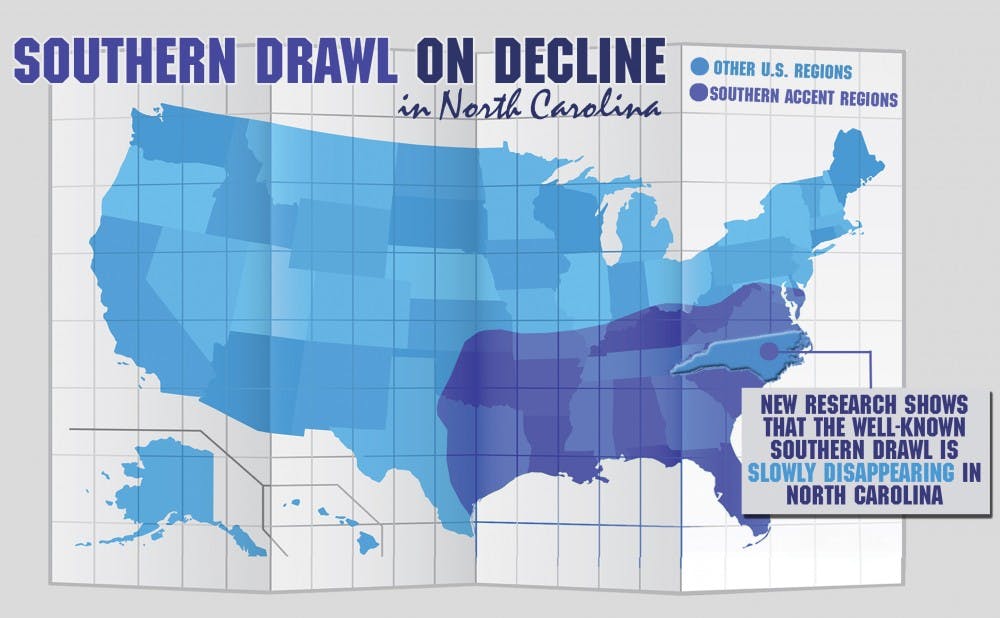New research shows that the well-known Southern drawl is slowly disappearing in North Carolina.
Robin Dodsworth, associate professor of linguistics at North Carolina State University, has used recordings of hundreds of Raleigh residents in order to study changes in the Southern accent. What she found is that some of the unique vowel sounds most commonly associated with Southern speech are now harder to find in Raleigh. Multiple factors such as urbanization and stigmatization may have played a role in this transformation. Even in retreat, however, the quintessential Southern accent continues to carry significant weight in people’s cultural imagination.
Linguists are unsure as to exactly when the Southern accent developed, but it might be a more recent development than most people tend to think.

“There is some evidence that it had probably gotten started by the Civil War,” Dodsworth said. “There’s no way it was in full force by then. It's possible that it only really got going toward the end of the second half of the 19th century.”
Dodsworth added that from then on it is easier to track when the Southern accent took hold in North Carolina.
“What I can tell you for sure is that the Southern shift had hit Raleigh by the early 20th century, no question,” Dodsworth said. “The very oldest speakers of Raleigh were born in the 1920s and 1930s, and they most definitely are southern-shifted.”
Dodsworth noted, however, that when she looked at Raleigh residents born in the 1960s, the Southern accent seemed to be in decline.
“The Southern shifted accent definitely started to retreat in Raleigh starting with people born in 1950,” Dodsworth said. “It's been gradually, gradually, gradually in retreat ever since that time. It’s happening all across the urban South. All these places are going to be retreating from the older Southern system to what you can call an a-regional accent.”
Dodsworth added that Raleigh’s growth as an industrial center in the early 1960s was a strong contributor to this shift.
“Following World War II, a lot of people moved down from the North to the South for work, and we saw an industrial boom because it was easier to set up shop here,” Dodsworth said. “In Raleigh specifically, Research Triangle Park and in particular IBM got going, and that drew a lot of white-collar workers from various Northern places to come down here for work.”
Youth migration in particular was probably a strong cause of this transition to the a-regional accent, Dodsworth said.
“What you have then is what we call a dialect contact situation,” she explained. “A lot of people from elsewhere brought their kids, and those kids infiltrated the schools here. and little by little by little over the course of several decades Southern features kind of got washed out.”
Although the Southern accent might be in retreat, it has by no means completely disappeared, said Walt Wolfram, William C. Friday distinguished professor of English Linguistics at NC State. He noted that while the accent remains prevalent in rural areas, it has become less pronounced in urban areas.
“The traditional southern dialect has a much more rural connotation now,” Wolfram said. “The urban south is still Southern but it’s just that a lot of the more salient features of the accent have been leveled.”
Dodsworth noted, however, that migration is not the only cause of this shift. The stigmatization of the southern accent in popular culture encouraged residents of the urban south to abandon their old way of speaking.
“A lot of people in southern cities want to cultivate a certain sort of identity,” she said. “[They want] people who are from the North to respect them so they’re not seen as stupid or lazy or something, which is of course absolutely ridiculous because there’s nothing stupid or lazy about the Southern accent.”
Linguists have long known that people exhibit biases and make character judgements based on accents, Dodsworth explained.
“There have been various kinds of experiments, and all of it more or less concludes that we all assign personal characteristics to dialects,” she said. “Even if all we’re paying attention to is one feature, we conclude things about the person like level of intelligence, friendliness and other complicated traits. It’s pretty unambiguous that we do that. ”
Get The Chronicle straight to your inbox
Sign up for our weekly newsletter. Cancel at any time.
Gareth Price, visiting assistant professor of linguistics at Duke, noted that this effect can be seen in the Netflix show "House of Cards."
“My guess is that the choice of the Southern accent, rather than a Midwestern or Boston accent, goes all the way back to the Mason-Dixon line and all the way to the North-South divide,” Price said. “The contrast there between the Southern accent and the D.C. accent is particularly stark, and it helps to set up some real opposition and conflict for the characters in the show.”
There are numerous documented examples of politicians changing their accent, whether consciously or unconsciously, in order to reap the benefits of sounding familiar, Wolfram said.
“When Governor [Pat] McCrory was campaigning, he got into trouble for trying to sound too folksy and North Carolinian," he explained. "People said it wasn’t him and where he came from, so it was kind of a paternalism he was using to sound more homey.”
Price added that, ultimately, the accents politicians use can have significant implications for how voters perceive them.
“It doesn’t matter if you’re a Republican or a Democrat,” Price said. “If you sound too much like you’re from the Boston Brahmins in the Northeast, you’re not going to do particularly well at all in North Carolina.”

